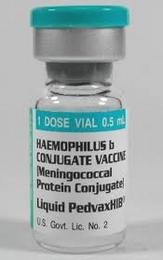The vaccine against Haemophilus influenzae type B – Hib vaccine
What is Hib disease?
Haemophilus influenzae type B, or hib – disease, caused by a bacterial infection. It usually affects children under five years. Hib can cause the following diseases:
- Meningitis;
- Pneumonia;
- Tumor in the throat;
- Other types of infections;
- Death.
People can carry Hib bacteria, without knowing it. These microorganisms can be transmitted from person to person, usually, via droplets from an infected person. When the infection is in the nose and throat, nausea and weakness usually does not occur. But when it is spread to the lungs and in the blood, can appear serious health problems.
Symptoms of Hib infection include:
- Fever;
- Lethargy;
- Vomiting;
- Kryvosheya;
- Other symptoms, depending on the affected part of the body.
Usually symptoms appear in less than 10 days after exposure. The disease is treated with antibiotics.
What is the vaccine against Haemophilus influenzae type B?
Hib vaccine comprises inactivated bacteria and elements inserted into the muscle.

Who and when to be vaccinated?
Generally, children should be vaccinated in the following terms:
- 2 of the month;
- 4 of the month;
- 6 months;
- 12-15 months.
But in some cases, the child needs only three vaccination. It depends, what brand of vaccine used by doctors.
Besides, if vaccination is missing, talk to your doctor. There are different schedules of vaccination catching depending on the brand of vaccine and the age of the child.
This vaccine is generally not recommended for children aged about five years of age or older and adults. But it can be introduced, if you or your child has not been vaccinated previously, and there are certain diseases, such as:
- Serpovidnokletochnaya anemia;
- Leukemia;
- HIV;
- Splenectomy.
Risks, associated with the vaccine against Haemophilus influenzae type B
As with any vaccine, Hib vaccine can cause serious problems, such as heavy allergic reactions. Although most people have no problems, sometimes there is redness, fever, or swelling near the injection site, and fever.
Sometimes used paracetamol, to reduce pain and fever, which may occur after vaccination. In children, the medicine may weaken the effectiveness of the vaccine. It should discuss the risks and benefits, associated with the use of paracetamol with a doctor.
Who should not be vaccinated against Hib?
It is impossible to vaccinate the following groups of people:
- Children under the age of five years, or a little younger;
- People, who have ever had a life-threatening allergic reaction to a previous dose of Hib vaccine;
- People, who are moderately or severely ill. Before you learn some dose of vaccine, they must recover.
What are the ways to prevent Hib vaccination in addition?
Antibiotics may be prescribed for infants and young children, that were not vaccinated and were susceptible to the disease.
What happens in the event of an outbreak of disease?
In the event of an outbreak, public health authorities determine, who is at risk, and should be vaccinated.
